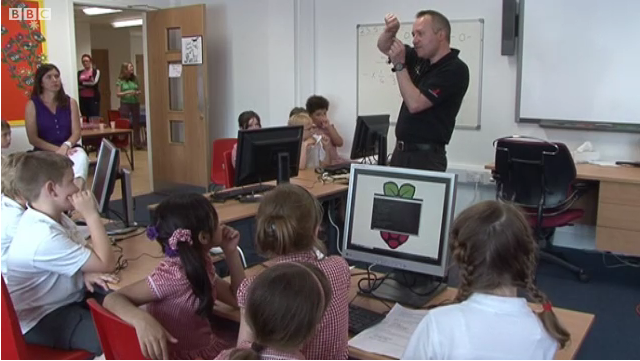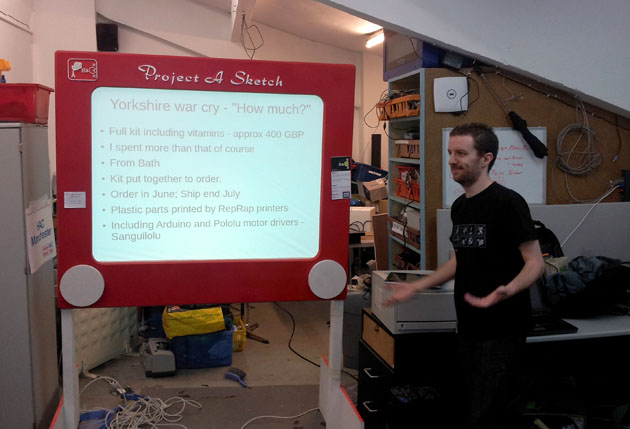BBC news video – Raspberry Pi at St Matthew’s primary school
The BBC’s news videos usually aren’t embeddable until a day or so after their first release, so you’ll have to go to the BBC News website to watch this, but it’s well worth the click.

Pete, some primary school students, and ten Raspberry Pis. (That's Sue looking on from the corridor.) Click the image to watch on the BBC website.
Our good friends Dr Sue Black of the GoTo Foundation, and Pete Wood from RS Components, took a class of seven to nine year-olds (years 3 and 4) at St Matthew’s Church of England Primary School in Surbiton, Surrey, and got them programming the Raspberry Pi in Python as part of a GoTo Foundation event. The results were pretty fantastic – the kids were buzzing, got playing with embedded hardware as well as software, and gave us all a neat demonstration of just how tractable and enjoyable programming can be for children, if they’re only given the opportunity to dig a little into it.
Some kids of this age have trouble with the dexterity needed to type accurately (which is one of the reasons we recommend Scratch for younger students), and this is reflected in the video; it can be very frustrating to type a piece of code in over and over and keep getting it wrong. But others were flying with the Raspberry Pi, and were clearly more than ready to tackle some Python, getting lots out of the experience.
We’re really proud to see so many happy faces from the lesson. Work continues on getting stuff ready for the schools release (which will also include cases for the Raspberry Pi) later in the year. We hope to see lots more of this kind of teaching session to come.






30 comments
Doep100
First!
Whoohoo, my Pi arrived on Friday! Where can I find that global map again to mark my location?
Raspberry Pi Staff liz — post author
The map’s at http://rastrack.ryanteck.org.uk/ – really glad yours has turned up!
Andy
Anyone else find it strange that most of the comments about the Raspberry Pi from people seem to be about the lack of a case? Is this what most concerns people?
Raspberry Pi Staff liz — post author
Apparently so. (We do notice that a lot of people *like* the lack of a case too – but it’s a very unusual thing for people used to retail hardware.)
Christopher Obbard
Would be lovely to have an official lovely crystal (clear) coloured injection molded case!
Then again, there are some designs out there already which could be used by the Foundation to prevent waste of your (precious) time?
Also, I’m part of a small software company based on the Isle of Wight specializing in custom Linux distros for embedded hardware. Please get in touch, I want to get the Pi supported!
Wombat
Adafruit do a lovely looking clip together kit case, does any one sell it in the UK?
http://www.geek.com/articles/chips/adafruits-transparent-raspberry-pi-case-uses-dragon-claws-2012069/
Thinking of taking a duvet or sickie day off tommrow as Fanrell have just emailed me that my PI is on its way. So it looks like a new batch has arrived in the UK!
Tandy
At Tandy we are currently considering stocking many of the Adafruit products in the UK.
David Tudor
I for one would love to see a link to the worksheets that are used during these videos so that I could reproduce them with my 6 & 9 year old nephews.
Although I do have the projects & guides in the excellent MagPi magazine to keep them occupied for now.
I did get the 9 year an electronics starter kit as a present last Christmas & I’ve had my RPI a while now so this weekend we will do the “In Control” project from MagPi Issue 2 & I can’t tell you how much I’m looking forward to it!
Jeremy Freudberg
I noticed that one kid mentioned one of the computers going a bit cuckoo. This prompted me to ask, “Why boot into LXDE and launch a terminal emulator in X-which-uses-more-CPU-which-causes-in-some-cases-power-stability rather than just use the pre-X-CPU-and-power-saving terminal?”
Lars T. Hansen
You only have power instability, if, and only if, your power supply cannot supply the enogh current at +5 volts to the Pi and any connected hardware. (FYI, Electric current is measured in the SI unit called ampere, A).
Power instability is only a electronics thing, not software – and AFAIK there is no kind of power saving activated in the Pi.
I guess there quite a bit of too oversold and/or too inexpensive +5 volt power supplies out there.
I think the i3wm http://i3wm.org/ tiling windows manager is a good choice for the pi: With dependecies it is on Debian only a 11 MB download from the package repositories (testet on x86 machine architecture).
Raspberry Pi Staff liz — post author
Also, I should point out that no kids there were subject to any crashes, power issues or anything else frightening – any suggestion that that was what was going on is all in OP’s head. What the boy you’re referring to was bothered by was the IDE not being awfully understandable for a 7-year-old. Which kind of makes sense.
Jeremy Freudberg
(Just for reference I was talking about 2:03 in the video)
Apot1
It’s really revealing to see the video, it shows what makes programming hard and annoying when you begin:
First of all in python you can type commands and it will execute them directly. This has the advantage, that you can see the result immediately and when you make an error you see it as soon as you hit return. But for a kid that also means you have to type it over and over again until you get it right.
I remember programming in MS QBasic as a kid, and the default setting was to also notify the user about a syntax error as soon as you hit return, but this was in the code editor, so you would use the cursor keys to edit out the errors directly instad of writing the same line again. If you did everything correct, it would automatically “pretty-print” the line.
I think it is important to have a good language aware editor that is able to do something like QBasic did for kids to not get annoyed very quickly. Syntax highlighting and even squiggly lines like better IDEs have it nowadays might not even be enough, because as a beginner you might ignore them and also they don’t give enough info about the nature of the error.
Norman Dunbar
Hi PM,
The famous Liam Fraser is currently doing a tutorial series in the Linux User & Developer magazine. This month (Issue 114 with Raspberry Pi all over the cover) he’s doing Python programming. He advises the use of an IDE named Geany which I believe is installed on the Menu under “Programs”.
Maybe that would be a better idea for a starting point? It’s apparently simple to use and lightweight – so good on a Pi then.
I can’t comment myself as my Pi is not due for delivery until July or August – boo hiss!
It appears that the IDE simply saves your text in a file and then executes it via the Python interpreter in the shell.
HTH
Cheers,
Norm.
Joe Desbonnet
Looking at that clip I really do wonder if Python is a good choice as an introductory language for kids. But what are the alternatives? BASIC? (did me no harm when I was a kid :-) Has anyone done research into ideal teaching languages at ages <10?
Raspberry Pi Staff liz — post author
Generally, we recommend Scratch for kids of this age (Kid’s Ruby’s great too); but there’s nothing wrong with Python for many kids. Part of the issue here is that children’s ability in both abstract thinking and in the manual dexterity I mentioned above vary massively in this age group. So some of them will fly with Python; some others will need a bit more help. It’s good to expose them to what’s possible, though. I don’t like this lowest-common-denominator idea that we should just present them with the easiest package for their age group. Some respond far better to being stretched.
Zinahe Asnake
IMHO, it’s really wrong to try to teach such young kids to program using the Python IDLE. Don’t get me wrong; I love Python. But this noble idea could have been implemented better.
Raspberry Pi Staff liz — post author
The teachers running the show didn’t agree with you! (There was Scratch work and other stuff going on in other rooms – this was just what the Beeb chose to feature.)
Ooh-Jama-Flip
“So some of them will fly with Python; some others will need a bit more help. It’s good to expose them to what’s possible, though. I don’t like this lowest-common-denominator idea that we should just present them with the easiest package for their age group. Some respond far better to being stretched.”
I couldn’t agree more with this statement, different children advance at different rates, some fly early, others start off slower and then catch up later, give the fast starters what they need to fly, let the slower starters have what they need to get going, and then progress.
For too long now, everything has been geared for the lowest common denominator, it’s about time that this is dealt with.
I’m not saying forget about the slowest starters, far from it, they should be helped as much as needed, but for heavens sake, don’t hold back the flyers, let them spread they’re wings, and fly !
William H. Bell
Given a few Raspberry PIs in hand, it would be great to be involved with something of this nature. The local Beta testing crew (aged 5 and 7) were having a whale of a time with Scratch this evening.
As part of the general campaign, is the Model A release date known roughly? It would be good to be able to go to the French authorities with a Model A working setup. The current idea of IT in the local primary schools is just MS, mouse and internet :-( We need some more visibility. The last article Le Monde ran was on the 29th of February to criticise the supply chain :-(
Raspberry Pi Staff liz — post author
I know that at least one manufacturer is planning on a September build; earlier if they can clear their backlog before then (but orders keep coming through at an ungodly rate, so realistically it’s likely to be September). The A will definitely be happening – we’re all contracted to make sure it goes ahead as planned – but the demand so far for the B has been so outlandish that a lot of plans have had to be changed or abandoned to get things working as well as they are at the moment. And we’re very aware that what we have at the moment isn’t optimal – yet.
William H. Bell
Hi Liz,
Just out of curiosity, are the figures of how many PIs have been requested+ordered+delivered publicly available? Even an order of magnitude would be amusing.
Many thanks, Will
Raspberry Pi Staff liz — post author
I don’t have very precise figures, but I know that we’re anticipating having shipped half a million by September.
Jeremy Freudberg
I will just say, British children have the cutest voices ever.
gregd99
have just noticed that VIA have announced a platform that has a lot of hardware similarities with the pi. http://androidonpc.com/android-motherboard-for-pc/
the SW approach is very different with android adopted – I wonder how easy this is to use with a keyboard and mouse – rather than Linux.
It costs a few dollars more, has more ports, more memory and a power supply.
interesting to see a mainstream manufacturer thinking about this part of the market.
PeteWood@DesignSpark
Thanks for posting this Liz. It was a brilliant day and full marks to Dr Sue Black for organising this.
Raspberry Pi Staff liz — post author
Thanks Pete! We’ve all been clustered around the video pointing at you and going “Cor. He’s good at this, isn’t he?” :)
Wil Baker
Hi,
When do you expect raspberry Pi to released for primary schools? I would be interested in buying some for ICT lessons and extra-curriculum clubs but money might be an issue. Do you know roughly how much the PI would cost? Would there be any lesson support as I don’t have any background in programming?
Many thanks,
Wil
Amy
Hi, looking into buying around 12 Raspberry Pi’s for our Primary School as part of the new computing curriculum. Anybody know anywhere that does discount for schools on these?
Many thanks
Raspberry Pi Staff liz — post author
We already sell them at the very lowest possible price to everybody, but as a school you should be able to claim back your VAT, and you’ll save by shipping in bulk. This is a very old thread, so people aren’t likely to see your post here, but if you visit the forums (link at top of page) you’ll get plenty of help.